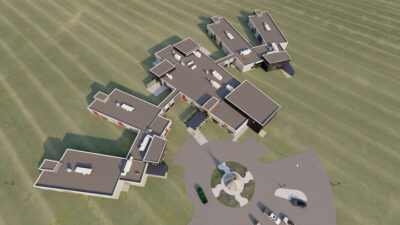Construction starting on new Blood Tribe recovery community
By Lethbridge Herald on July 19, 2023.
 IMAGE COURTESY OF GOVERNMENT OF ALBERTA
This image shows the design of the 75-bed recovery community that is being constructed on the Blood Tribe at Moses Lake near Cardston.
IMAGE COURTESY OF GOVERNMENT OF ALBERTA
This image shows the design of the 75-bed recovery community that is being constructed on the Blood Tribe at Moses Lake near Cardston.Al Beeber
Lethbridge Herald
Ground was broken Wednesday on a Blood Tribe recovery community at Moses Lake just outside of Cardston.
The 75-bed facility is a joint project involving the provincial government and the Blood Tribe. It is being supported by a $30-million initial capital investment from the province plus operating costs. It’s expected to open by the end of 2024.
The building design will be unique and was conceived after extensive consultation with the Blood Tribe community.
The facility will be able to accommodate up to 300 people a year on their journey to recovery from addictions. Non-Indigenous people will also be able to receive treatment there as well.
The length of time a person spends in the community will depend upon the individual with stays up to a year or longer possible as the healing process continues.
The community will combine western and traditional healing methods to help those suffering from addictions recover.
The programming, said Piinakoyim Tailfeathers, designate for Chief Roy Fox, is “designed by our people, for our people.”
“We recognize that drug abuse is only a symptom of a much larger issue and that we need to address poverty and the inequalities and trauma our people face daily and treat the root cause of addiction.
“We need to find our own path to healing. Every one of us in this community has suffered, trauma, grief and loss of life” and many continually to work valiantly through that, he said, adding every family and generation has been affected.
“Our people are in pain and this facility is much needed. The Blood Tribe looks to lead the way as we always do .. . This expansion of our services is much needed, a key component to healing,” added Tailfeathers.
Mike Ellis, Minister of Public Safety and Emergency Services, said people living on the streets for long periods of time “need to learn how to live again” and by going through the recovery process they’ll be in a better place at the end than when they started.
“The community will provide hope for a higher quality of life,” said Charles Weasel Head, vice chair of the Blood Tribe Department of Health in an opening statement at a morning event on site.
“It would not have been possible without the support, initiative and shared vision expressed by our provincial government. Your commitment and your recognition of the importance of addressing the opioid crisis which affects the health and well-being of all persons across the country and your rapid response will continue to have a positive impact on the lives of our young people and to our communities is remarkable and priceless,” said Weasel Head.
“Our provincial government has made mental health and addiction a priority, a mandate to create awareness including exchange through policy and drivers of social change. But we all have a stake in the opioid crisis – the community voice and action is just as important, if not more so than ours. It’s often been said it takes people to fix people, not systems. We need everyone’s support to change the direction of the opioid crisis, to change the status quo and to provide our community some reason to believe that there is hope for a better future when we all work together,” he said.
“It matters because our young people, our loved ones are suffering and dying at an alarming rate. It matters because children are being left without families,” Weasel Head said.
“Today is about listening to the voices of all people, the most vulnerable, the ones with lived experience that can support and educate us.”
Minister of Mental Health and Addictions Dan Williams called the event an historic occasion.
“Blood Tribe has a rich and deep history and it’s important we conserve and preserve that,” he said.
The announcement speaks to the importance the UCP puts to the Blood Tribe community and the recovery approach to care, he said.
“Today we’re celebrating the beginning of the construction of this recovery community that will one day stand tall,”he said, adding the Blood Tribe’s connection to the land is sacred which will be honoured through the design of the building to the treatment provided.
The facility comes at a time of greater awareness, he said, “of the devastating toll that the deadly disease of addiction is having on Alberta and Albertans. Addiction’s a complex issue, of course, and requires a co-ordinated response across government ministries and departments and between all levels of government, health care providers, first responders…law enforcement, First Nations partners.
“This crisis has reached every corner of our province. We cannot ignore the fact that Indigenous communities have been disproportionately affected and the devastating tolls taken on them is more and more evident.
“We’ve made significant strides in responding to this crisis but we know more needs to be done,” Williams added.
“Access to land -based, culturally integrated addictions treatment services is often limited or missing completely. And that’s why our government is stepping into the void that was left by the federal government and partnering with First Nation communities to establish holistic addiction treatment facilities on First Nations land.
“The Blood Tribe Recovery Community will be the first of four” built on this model of building alongside First Nations and collaborating with them, he said.
“The breaking of this ground today is an important significant milestone in our community for both partnership with the Blood Tribe nation and also a sense of progress we have as province and a society moving toward recovery, holistic healing for those who are addicted,” Williams said.
The design of the building is meant to accommodate cultural healing and ceremonies, including smudging, dancing and drumming.
“In coming months we’re going to work closely with community leaders to incorporate this land-based holistic healing into the treatment programming itself. Recovery communities are an important part of the recovery-oriented model of care,” Williams added.
“Addiction doesn’t just impact one’s health or one’s well-being, it damages relationships, it affects the community, it affects work” and it erodes a person’s sense of self and relationship with community, he said.
Recovery communities give people the resources they need and time to focus exclusively on recovery, Williams said.
And unlike in conventional treatment centres, Albertans can spend up to a year in a supportive environment at no cost, the minister added.
Rick Wilson, Minister of Indigenous Relations, said the event was “a celebration for our work to advance Reconciliation,” which he said the government takes seriously.
“We want to support Indigenous health solutions to addictions and mental health issues,” Wilson added.
“We all stand united to create innovative solutions that are going to help support our communities, Indigenous and non-Indigenous and I’m also proud that Indigenous health solutions to care will also help benefit every patient in terms of mind, body and soul.
“Indigenous ways of knowing, their stories and the culture are important and they’re unique and will help them on that road to recovery.”
Derrick Fox, CEO of the Blood Tribe Department of Health, said the tribe appreciates the government investment in the recovery community “that will assist the tribe and community deal with the addictions crisis we face. Especially in light of the states of emergency that have been called since 2015.”
Fox said the Tribe is appreciative of the government’s commitment to help provide hope for people battling addictions “and strengthening our continuum of care.
He said Bringing the Spirit Home detox program was a success, being rooted in the Blackfoot way of healing which aims to improve commmunity health and to reduce health inequities for the most disadvantaged and vulnerable members.
40-39





I sincerely hope many of the poor souls experiencing addiction on the streets of Lethbridge can find healing here …